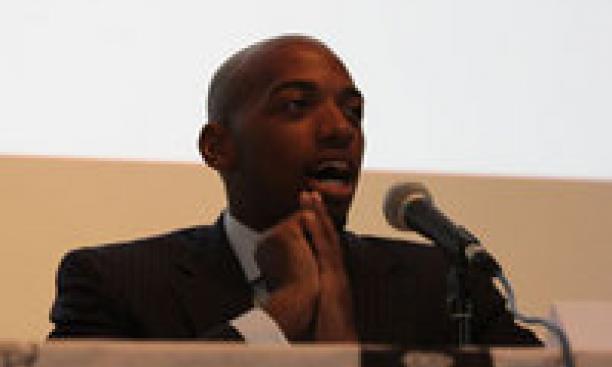

In an Oct. 15 panel discussion titled “Education as the Civil Rights Issue of Our Time,” New York City schools chancellor Joel Klein, Newark School Advisory Board president Shavar Jeffries, and Coney Island Prep dean of students Leslie-Bernard Joseph ’06 discussed educational reform in the United States and the role of undergraduates in the reform movement.
“Students around the world vote with their feet to study at our colleges, but we are not preparing our own students to attend these institutions,” said President Tilghman, the panel's moderator. “This is the challenge we are here to discuss.”
Joseph, who holds a B.A. in politics from Princeton, kicked off the panel with an anecdote about his sixth-grade student who, unable to answer any questions on a quiz, had simply written “I need help” instead of the answers on the quiz. Joseph keeps the note in his office to remind himself of his mission as a teacher.
“What I realized from the moment I walked into the classroom is that schools look nothing like what they were supposed to,” he said. He explained that this isn’t because of crumbling paint or old books, but rather a missing sense of possibility and hope.
Jeffries echoed this sentiment, calling the lack of expectation “fundamental” and “insidious.” “I grew up in Newark, and college seemed like this foreign thing,” he said. “It didn’t really seem real.”
Joseph said that teachers should be measured by the value that they add in the classroom. “I don’t get paid to teach students who would have learned on their own,” he said. “It’s my job to motivate kids.”
Yet real accountability for teachers is still missing from the system, Klein said, and the focus is “on the wrong thing … the adults, and not the children.”
“The fact that there are no perfect evaluations [of teachers] is an excuse for us not doing the evaluations,” he said. “There will never be perfect metrics. We’ve got to change teaching from a trade-union, assembly-line job to a profession where excellence is the hallmark.”
Joseph added that establishing a clear pathway to leadership is an important step in developing better teachers. “Teachers become very complacent,” he said. “No one expects when they enter a job to never, ever get a promotion. … With a pathway to success, competition and performance are encouraged and aren’t just happenstance.”
Jeffries, however, cautioned against being overly critical of teacher unions. He believes that the unions are simply doing what they are supposed to do from a democratic standpoint.
“They have beliefs,” he said, “and they organize themselves around those beliefs. At the end of the day, this is a political problem.” That unions are organizing political efforts to pursue their interests is admirable, Jeffries said, and citizens themselves need to “engage in the nuts and bolts to change the system to reflect the interests of children.”
The panel, sponsored by Teach For America, the national non-profit organization Students for Education Reform, and the Princeton Undergraduate Student Government, was part of Princeton’s “Education Week,” a five-day campaign to raise awareness of current issues in education reform and empower undergraduates to take active roles in addressing these issues.

